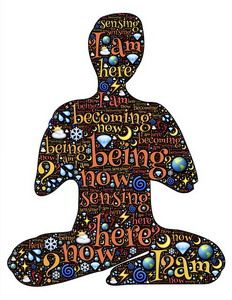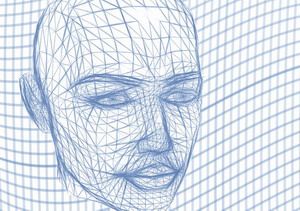 Disconnection and loneliness are signs of a loss of receptivity and participation in the sensory moment.
Disconnection and loneliness are signs of a loss of receptivity and participation in the sensory moment.
Most religions of the world understand that the fundamental core discontent deep in the heart of humans lies in his and her feelings of separation from life/God. Each religion will have it’s own metaphorical story about how we were once in a state of oneness and then took on the powers of critical judgment through the ability to recall the past and project possible outcomes into the future. The story about living in Eden and eating an apple from the tree of knowledge, for instance, is one example. This separated us from the feeling experience of the present moment as we spent more and more time thinking about what was and what might be coming.
 Much rhetoric has been expended over the past several years about the spiritual importance of “Being in the Now.” And while I am in complete agreement with the importance of being present, I have found much of what has been said to be overly obtuse. Sometimes I think being vague is part of the mystique of being a spiritual speaker. If you were really clear then you would only have to say things once to be understood. How could anyone make a living giving speeches if they only had to give their speech once?
Much rhetoric has been expended over the past several years about the spiritual importance of “Being in the Now.” And while I am in complete agreement with the importance of being present, I have found much of what has been said to be overly obtuse. Sometimes I think being vague is part of the mystique of being a spiritual speaker. If you were really clear then you would only have to say things once to be understood. How could anyone make a living giving speeches if they only had to give their speech once?
Perhaps a way to bring the mystique of “Be here Now” a little more down to earth, I thought to re-characterize the whole concept as “Being in the Sensory Moment.”
 If you are sitting in your chair and you feel the air conditioner blowing a breeze on your face, you are experiencing the sensation of that breeze in that moment. That would be a sensory moment. It is an experience brought to you by your senses. It is not a thought about whether you like or dislike the breeze. It is not a concern that you might get too cold in a little bit. It is not a memory of the high price of the electric bill last month because of that air conditioner. It is just the feeling sensory experience of that air on your face – no judgment, no future worry, and no past consideration.
If you are sitting in your chair and you feel the air conditioner blowing a breeze on your face, you are experiencing the sensation of that breeze in that moment. That would be a sensory moment. It is an experience brought to you by your senses. It is not a thought about whether you like or dislike the breeze. It is not a concern that you might get too cold in a little bit. It is not a memory of the high price of the electric bill last month because of that air conditioner. It is just the feeling sensory experience of that air on your face – no judgment, no future worry, and no past consideration.
Why is something that simple important? It is important because of the core discontent I mentioned initially. We experience life through our senses. It is this feeling sensory experience in the present that makes us feel connected to life. An extreme example of the importance of this is what happens to people in sensory deprivation tanks. They feel highly dissociated and most actually begin to freak out unless they have had training in deep meditation practices. And yet most people in their day-to-day life exist in a type of self-created deprivation tank. We train ourselves to ignore the messages from our body. Our focus is on our goals and getting our needs and wants met. We pay no attention to the thousands of signals every second from our body telling us everything about our connection to reality each moment. We expect the body to run on automatic like a chauffeur-driven limousine taking us to where we want to go.

We have learned to live in our heads in this culture. While this serves our survival needs, comfort desires, and creative drives, it has a hidden impact we did not anticipate. The loss of our conscious participation in our sensory relationship to life leaves us feeling disconnected and alone. This aloneness stirs the deep discontent within our heart created by our perceived separation from life – the separation we believed happened when we were taken from the womb of oneness and popped out into this world at birth. This uncomfortable feeling drives us more into our head to get away from the feeling. When that doesn’t work we start engaging in various compensatory behaviors to try to “fix” the feeling – eating, drinking, sexing, drugging, risking, etc…
Compensatory behaviors by their nature only work temporarily to cover up the discontent because they are not addressing the real problem. We feel disconnected because we are disconnected. Yes we had a big shift in the ease of connection feeling going from the womb to the outside world. We were literally plugged in to feeling one with mom/life neurologically, hormonally, and chemically. Once out in the world we have to activate our senses to receive the world and relate to it. We begin doing this as a newborn, and we experience the wonder of a much wider world through sight, sound, smell, taste, and a dozen other senses, all of which we didn’t use in the womb because we did not need them.

As we learn to use these new senses to perceive life, we are once again one with the world. But these senses include feelings we didn’t have in the womb like pain, hunger, thirst, need for air, warmth, and so on. We feel needs that demand to be met. This is where the challenge occurs. We have to figure out how to relate to life to get our needs met. We don’t have the instinctual preprogramming most animals have to get their needs met. We have to figure it out. This works better if we can learn from experience and anticipate outcomes as part of a trial and error method for improving our ability to meet those needs. We become smart, but begin to lose connection to the here and now as we spend more and more time anticipating needs and how to meet them. We stop being connected to life and just become consumers of life.
If you are a student of any Eastern philosophies you will recognize the most basic tenant of these philosophies; Our return to God is blocked by our thoughts of our desires and attachments in this world. The stoic and aesthetic philosophers in Western culture voiced similar views. This gives rise to all sorts of interesting beliefs about how various types of self-denial is spiritual. My belief is that this perspective all flows from this very simple and basic truth: We have the need and desire to survive, thrive, and create. This human drive takes us out of the experience of our sensory connection to the world and into our memories and projections into the future to become more effective at getting our wants met like other animals. Unfortunately when we do this we lose our feeling of connection to life/nature/God and feel alone and discontented.

To be happy we need to feel connected and one with life. To do this we have to dwell in our sensory experience of the present moment in our life. We have to not only receive this input, but we have to participate with life directly through our actions. We need to be a part of life moment by moment. We get this kind of experience in physical activities like free-form dancing, play, walking in nature without a goal. As soon as we put a goal on any activity we step out of the feeling experience of the activity and focus on the goal – which is in the future. Achieving a goal can produce excitement, but it does not fill the need for connection to life.

Am I saying that goal-directed behavior is bad? No, not at all. Goal-directed thoughts and actions work well to aid us in getting our needs met on many levels. The point is that it does not and can not get our most basic feeling need met – the need to feel connected and one with life/God. Without that connection we are not really able to be sane. That feeling of lack bubbles up from our unconscious and produces all kinds of craziness in our lives. It is because we are starving for this deep need to feel connected, and the harder we try to fix it, the worse it gets. It is not a problem that can be fixed with our mind. Nothing is broken. We simply are ignoring the connection we always have. We have made this lack into a belief in some great big thing that is missing in our lives when in truth it is a very small thing – the art of being present and just feeling what our senses have to tell us.
 You don’t need to go meditate on a mountaintop in Tibet or attend American Indian sweat lodge rituals or even be initiated into great mystery schools. All you need to do is feel the wind on your face, feel gratitude for the warmth of the sun, or listen to music that touches your heart. Caress a loved one just because you care. Participate with people just to be present and experience who they are and share who you are. We need balance. Goals are fine as a part of life, but not to the exclusion of simply being present with life. We need both to be balanced. We need both to be whole.
You don’t need to go meditate on a mountaintop in Tibet or attend American Indian sweat lodge rituals or even be initiated into great mystery schools. All you need to do is feel the wind on your face, feel gratitude for the warmth of the sun, or listen to music that touches your heart. Caress a loved one just because you care. Participate with people just to be present and experience who they are and share who you are. We need balance. Goals are fine as a part of life, but not to the exclusion of simply being present with life. We need both to be balanced. We need both to be whole.
